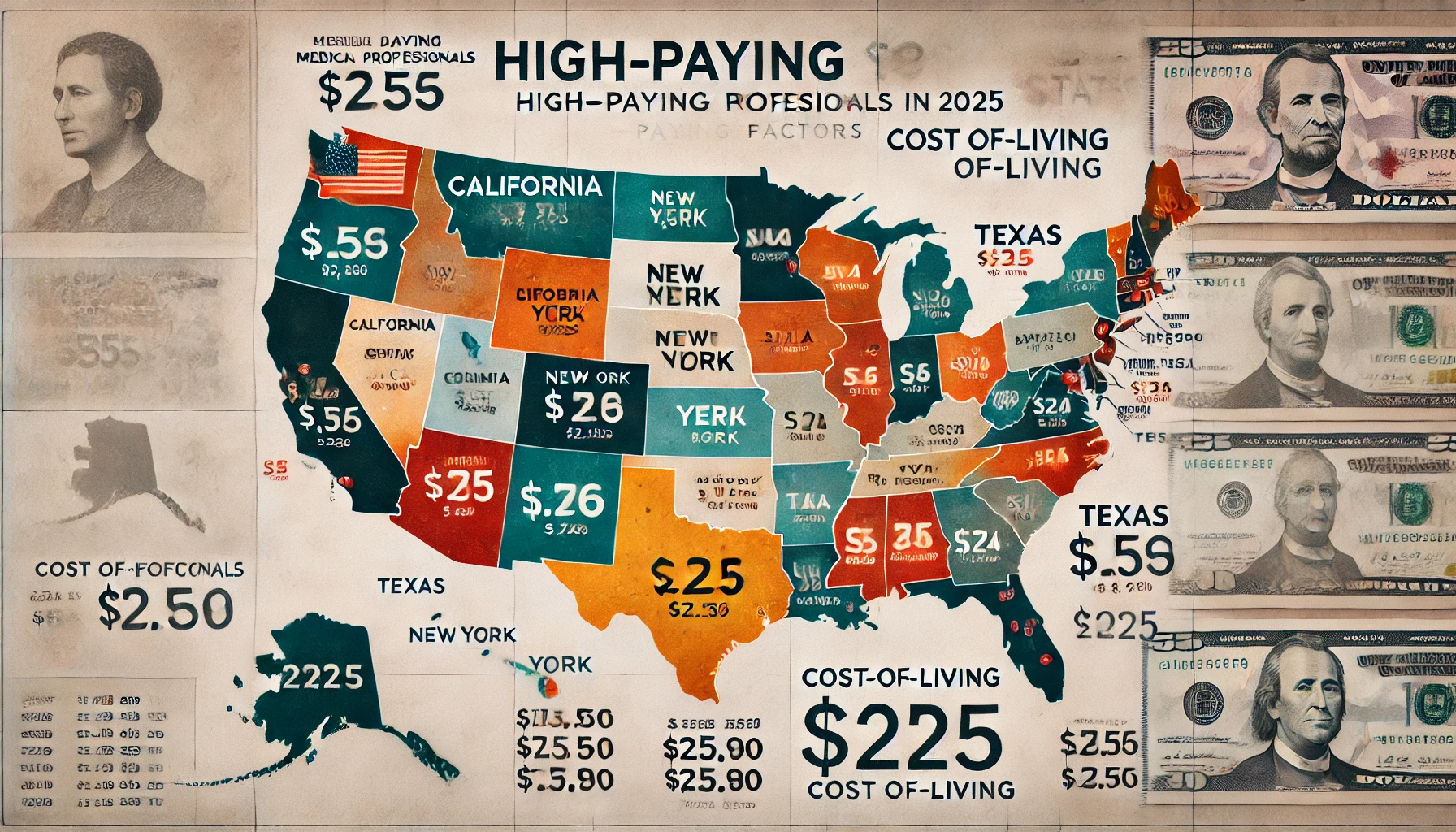Curious about the current state of medical salaries in the USA? The U.S. healthcare sector provides numerous opportunities for career growth and income potential. With the demand for medical professionals rising and a growing labor shortage, understanding salary trends can help you make informed decisions about your career. Whether you are a physician, nurse, technician, or considering a healthcare career shift, knowing how to maximize your earnings and where to find the highest-paying jobs is essential. This guide will walk you through crucial salary trends across specialties and geographic locations and offer practical tips for boosting your income in the coming years.
Trends in Medical Salaries in the USA
Medical salaries in the USA have seen steady growth over the past few years, driven by factors such as the aging population, the need for more specialized care, and ongoing staffing shortages. In 2025, these trends are expected to continue, with some key areas experiencing even faster growth in compensation.
1. Overall Salary Growth
According to recent data, the average salary for medical professionals is projected to increase by around 5-7% annually, depending on the role. Physicians and surgeons remain at the top of the earning spectrum, while specialized roles such as anesthesiologists, radiologists, and cardiologists command even higher salaries.
- Physician Salary: In 2025, physicians can expect an average salary of $300,000 to $450,000 annually, with specialists often exceeding the higher end of that range.
- Nursing Salary: Registered nurses (RNs) are anticipated to earn between $80,000 and $110,000 annually, with nurse practitioners (NPs) earning even higher, averaging around $120,000 to $140,000.
2. Impact of Specialization on Salary
Specialization is a key factor in influencing your income potential. Specialists like neurosurgeons, orthopedic surgeons, and cardiologists consistently rank among the highest-paid medical professionals in the U.S. This is due to the complexity of their work, the length of training required, and the high demand for these specialties.
- Top Earning Specialties in 2025:
- Neurosurgery: $750,000 – $850,000
- Orthopedic Surgery: $600,000 – $700,000
- Cardiology: $500,000 – $650,000
- Radiology: $450,000 – $550,000
- Anesthesiology: $400,000 – $500,000
Other high-demand specialties like oncology and dermatology also offer competitive salaries, often exceeding $400,000 annually.
Specialization is a crucial factor in income potential, with fields like neurosurgery and orthopedic surgery consistently ranking among the highest-paid specialties due to their complexity and demand. You can learn more about top-paying medical specialties through Medscape’s Physician Compensation Report.

3. Geographic Variation in Medical Salaries
Where you practice can significantly impact your salary. The cost of living, regional demand for healthcare services, and local labor shortages all contribute to salary variation across the country. In 2025, states like California, New York, and Texas are expected to continue offering some of the highest salaries for medical professionals.
- Top-Paying States in 2025:
- California: Physicians and specialists can earn 10-15% more than the national average.
- New York: Due to high demand and cost of living, salaries in New York remain competitive.
- Texas: A hub for medical innovation, Texas offers higher-than-average salaries across many medical professions.
However, don’t overlook states in the Midwest or South, where the cost of living is lower, yet salaries remain strong. For example, Ohio, Minnesota, and Georgia offer excellent pay scales relative to living costs.
4. The Role of Experience and Certification
Experience and certifications significantly impact your earning potential. Advanced certifications and sub-specializations can open doors to higher-paying roles. For example, a certified nurse anesthetist (CRNA) can earn up to $220,000 annually, well above the average for RNs.
- Physician Board Certification: Physicians with board certifications in specialized fields often see a 15-20% increase in salary.
- Advanced Practice Nurses: Nurse practitioners with specialized certifications (e.g., in acute care or family practice) command higher wages, averaging around $130,000 to $150,000 annually.

5. Negotiating a Higher Salary
Maximizing your salary in healthcare often comes down to negotiation. Whether you’re just starting or looking to advance, these tips can help you secure better pay:
- Research Market Rates: Before negotiating, research the average salary for your role in your region. Use tools like the American Medical Association (AMA) salary surveys or job boards like Indeed and Glassdoor.
- Leverage Your Experience: Highlight any specialized training, certifications, or leadership roles you’ve held, as these can justify a higher salary.
- Consider Non-Salary Perks: In addition to base salary, negotiate for benefits such as signing bonuses, relocation assistance, loan repayment, or paid time off.
- Know When to Ask: The best time to negotiate is after receiving a job offer before signing the contract. If you’re currently employed, consider negotiating at your annual review or after completing significant projects.
Professionals can explore healthcare salary variations across the U.S. and consider locum tenens roles for flexible, high-earning opportunities to maximize income potential.

How to Maximize Medical Salaries in the USA
Understanding salary trends is only one piece of the puzzle. To truly maximize your earnings, consider the following strategies:
1. Pursue Specializations in High-Demand Fields
As mentioned, specialization often leads to higher pay. If you’re currently in general practice or nursing, consider additional certifications or sub-specializations. Fields like telemedicine, geriatric care, and oncology will be in high demand in 2025.
2. Consider Geographic Flexibility
If you’re open to relocating, you can significantly increase your earning potential. Many healthcare facilities in rural areas or underserved regions offer higher salaries to attract talent. States with labor shortages or those that provide incentives for healthcare professionals may also present better earning opportunities.
3. Continue Your Education
Earning an advanced degree or certification can substantially boost your salary. For example, physicians who pursue fellowships in subspecialties often see a considerable pay increase. Similarly, nurses and physician assistants who earn master’s degrees or additional certifications can command higher salaries.
One effective way to boost your medical salary is through Continuing Medical Education (CME), which can open doors to higher-paying opportunities and improve job prospects. CME keeps you updated with the latest medical practices and enhances your qualifications, which many employers value in salary considerations. For more details on how CME can impact your earnings and the best ways to take advantage of it, check out this comprehensive guide on boosting your medical salary with CME.
4. Leverage Telemedicine Opportunities
The rise of telemedicine has expanded the opportunities for healthcare professionals to earn extra income. Many physicians, therapists, and mental health professionals now provide telemedicine services, allowing them to reach patients nationwide. In 2025, telemedicine is expected to be a $100 billion industry, offering lucrative opportunities for those who embrace it (For more detailed insights, you can explore the full article here: Boost Telemedicine Salary by 30% Fast).
5. Join Professional Networks
Building a network can significantly contribute to enhancing your income potential. Becoming a member of organizations, participating in conferences, and networking with colleagues can open doors to higher-paying opportunities. Being active in groups like the ANA (American Nurses Association) or the AMA (American Medical Association) can assist you in staying informed about job vacancies, salary benchmarks, and emerging trends in the industry.
Building a strong professional network is essential for career growth in healthcare. With insights from Transform Healthcare Networking, discover how effective networking can transform your career.

Conclusion: Key Takeaways on Medical Salaries in the USA: Trends, Growth, and Opportunities
Medical salaries in the USA continue to rise, with 2025 promising growth across most specialties and roles. To maximize your earnings, focus on gaining specialized skills, staying informed about regional pay trends, and negotiating strategically. Whether you’re a medical student, an experienced practitioner, or someone considering a career shift into healthcare, understanding the factors that impact salaries will empower you to make intelligent, informed decisions about your career. Remember that education, geographic flexibility, and strategic career moves are vital factors that will help you stand out and earn more in a competitive industry.
By staying proactive and leveraging the right opportunities, you can ensure a fulfilling and financially rewarding career in the healthcare industry.







